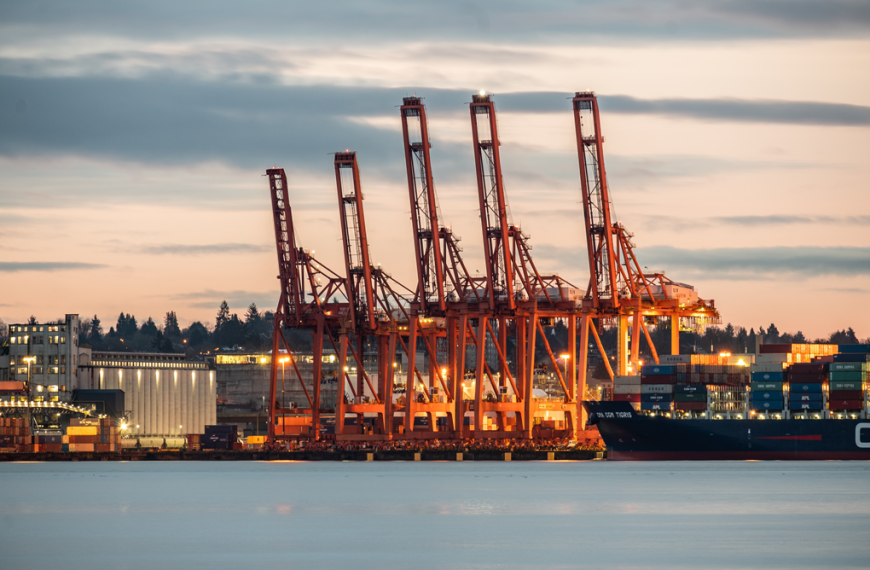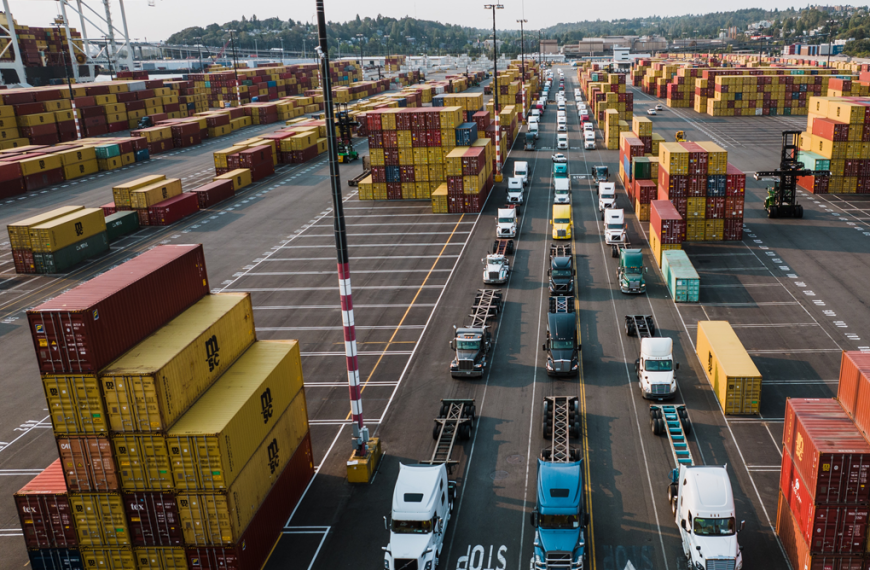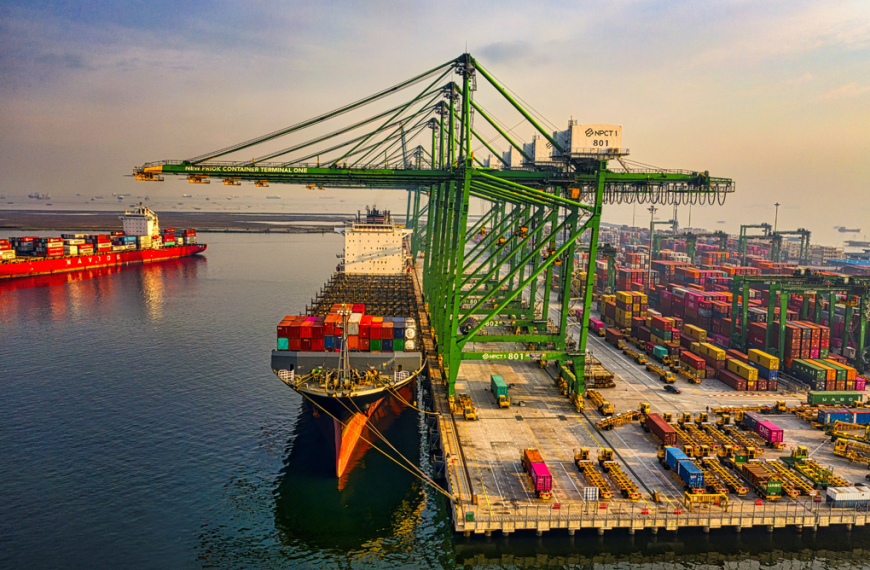Gain a comprehensive understanding of freight insurance, its importance, and the various types of coverage available. This informative article dives deep into the world of protecting your shipments and explores the risks associated with freight transportation.
Discover the factors to consider when selecting the right insurance for your cargo, and learn from real-life case studies that highlight the necessity of this vital safeguard. Find guidance on filing claims and uncover valuable tips for maximizing the benefits of freight insurance.
Equip yourself with the knowledge to navigate the complexities of coverage options and ensure the secure transportation of your goods.
- The Basics of Freight Insurance
- Common Risks in Freight Transportation and The Need For Insurance Coverage
- Exploring Different Types of Freight Insurance: Understanding Coverage Options
- Factors to Consider When Choosing Freight Insurance for Your Shipments
- Case Studies: Real-Life Examples Highlighting the Importance of Freight Insurance
- How to File a Claim: Navigating the Process of Freight Insurance
- Tips for Maximizing the Benefits of Freight Insurance: Best Practices and Strategies
- Frequently Asked Questions (FAQs)
- Related Articles
The Basics of Freight Insurance
When it comes to the world of freight transportation, ensuring the safety and security of your shipments is paramount. That’s where Freight Insurance comes into play—a crucial aspect of protecting your cargo throughout its journey. In this article, we’ll delve into the essentials of freight insurance, shedding light on its significance and the types of coverage available.

Why Freight Insurance Matters
Freight Insurance serves as a financial shield against potential losses and damages during transit. It safeguards your valuable shipments, giving you peace of mind and confidence in the face of unforeseen circumstances. Whether you’re shipping by sea freight, air freight, or any other mode, having the right insurance coverage can make all the difference.
Understanding Coverage Types
- General Liability: Provides broad coverage for various risks associated with freight transportation.
- Cargo Insurance: Specifically focuses on protecting the goods being transported.
- Freight Liability Insurance: Offers coverage for damages caused by carriers during transit.
Freight Insurance and the Digital Age
With advancements in technology, the freight industry has witnessed significant transformations. From freight visibility and tracking to digital freight forwarding, new tools and systems have revolutionized the way shipments are managed. These developments have also influenced the realm of freight insurance, providing enhanced accuracy, transparency, and efficiency.
Overcoming Challenges
The freight industry faces its fair share of challenges. From freight industry challenges like fluctuating freight rates to ensuring the security of cargo during transportation, each hurdle requires careful consideration. Freight insurance acts as a protective shield, mitigating risks and enabling businesses to navigate these obstacles confidently.
A Look into the Future
As the industry continues to evolve, exciting innovations like drone freight delivery and advancements in cold chain logistics are reshaping the way goods are transported. Such changes call for adaptable and comprehensive insurance solutions that keep pace with these emerging trends.
Let’s take a closer look at the different types of coverage provided by freight insurance:
| Coverage Type | Description |
|---|---|
| General Liability | Offers broad coverage against various risks in freight transportation. |
| Cargo Insurance | Protects the goods being transported, ensuring compensation for damages or losses. |
| Freight Liability Insurance | Provides coverage for damages caused by carriers during transit. |
As the world of freight transportation progresses, embracing digitalization and innovative solutions like digital freight forwarding and freight brokerage is crucial. These advancements offer greater efficiency, convenience, and cost-effectiveness.
Furthermore, last-mile delivery has become a focal point in the industry, emphasizing the importance of seamless and timely transportation. Freight insurance plays a pivotal role in supporting this critical aspect, reducing risks associated with the final leg of the journey.
In conclusion, understanding the basics of freight insurance is essential for businesses involved in the world of freight logistics. By ensuring proper coverage, including the specific requirements of sea freight, air freight, and other modes of transportation, you can protect your shipments and navigate the complexities of the industry with confidence.
Remember, when it comes to safeguarding your cargo, embracing the world of freight insurance is a wise and necessary choice.
Don’t leave your shipments vulnerable. Protect them with the right freight insurance coverage today!
Common Risks in Freight Transportation and The Need For Insurance Coverage
When it comes to the world of freight transportation, it’s important to be aware of the common risks that can jeopardize your valuable shipments. From unpredictable weather conditions to unforeseen accidents, the potential for losses and damages is ever-present. That’s why having Freight Insurance is crucial—providing you with the much-needed protection and peace of mind throughout the journey.
Understanding the Risks
To comprehend the importance of insurance coverage, let’s explore some of the common risks faced in freight transportation:
- Cargo Damage: Mishandling, improper storage, and accidents can result in damage to your cargo, leading to financial losses.
- Theft and Pilferage: Cargo theft remains a significant concern, and the risk of pilferage during transportation can’t be ignored.
- Natural Disasters: Adverse weather conditions, such as storms, hurricanes, or floods, can disrupt transportation and cause damage to goods.
- Delays and Inefficiencies: Freight transportation involves various stages, and delays or inefficiencies at any point can impact the timely delivery of shipments.
- Regulatory Compliance: Failing to comply with legal and regulatory requirements can result in fines, penalties, and delays.
The Need for Insurance Coverage
Given the inherent risks in the freight industry, it becomes evident why insurance coverage is essential for businesses involved in transportation and logistics. Here’s why you shouldn’t overlook the importance of freight insurance:
- Financial Protection: Freight insurance serves as a financial safety net, providing coverage for potential losses and damages during transit.
- Risk Mitigation: By transferring the risk to an insurance provider, you can minimize the financial impact of unforeseen events, ensuring your business remains resilient.
- Peace of Mind: Having the right insurance coverage gives you peace of mind, allowing you to focus on your core operations and customer satisfaction.
- Compliance and Liability: Insurance coverage helps meet regulatory requirements and protects against liability claims that may arise during transportation.
- Business Continuity: In the event of unforeseen incidents, insurance coverage ensures that your operations can continue smoothly, minimizing disruptions.
To highlight the importance of insurance coverage in freight transportation, here’s a table summarizing the key types of coverage available:
| Coverage Type | Description |
|---|---|
| Cargo Insurance | Protects the goods being transported against loss or damage during transit. |
| Freight Liability Insurance | Covers liabilities arising from damages caused by carriers during transportation. |
| Freight Forwarders Insurance | Offers comprehensive coverage for freight forwarders, protecting against various risks throughout the entire transportation process. |
| Marine Insurance | Specifically designed for sea freight, this coverage protects against perils and risks associated with maritime transportation. |
| Air Cargo Insurance | Tailored for air freight, this coverage safeguards shipments against damages, loss, or delays during air transportation. |
By selecting the appropriate insurance coverage for your specific needs, whether it’s sea freight, air freight, or any other mode of transportation, you can mitigate risks, safeguard your cargo, and ensure the smooth flow of your business operations.
In conclusion, understanding the common risks in freight transportation and the need for insurance coverage is vital for businesses in the industry. By acknowledging the potential challenges and taking proactive measures through proper insurance, you can protect your shipments, minimize financial losses, and maintain business continuity. Don’t leave your valuable cargo vulnerable—invest in freight insurance and embrace the peace of mind it brings.
Protect your shipments from the unpredictable. Get comprehensive freight insurance coverage today!

Exploring Different Types of Freight Insurance: Understanding Coverage Options
When it comes to safeguarding your valuable shipments in the ever-evolving world of freight transportation, having the right Freight Insurance is essential.
Understanding the various coverage options available allows you to tailor your insurance to meet specific needs, mitigating risks and ensuring the protection of your cargo. In this article, we’ll explore different types of freight insurance, providing insights into their coverage and benefits.
1. Cargo Insurance
Cargo Insurance is a fundamental type of coverage that focuses on protecting the goods being transported. It safeguards against a range of risks, including loss, damage, theft, and pilferage.
Whether you’re shipping by sea freight or air freight, cargo insurance provides financial compensation in case of unforeseen incidents during transit. This coverage gives you peace of mind, knowing that your cargo is protected from potential losses.
2. Freight Liability Insurance
Freight Liability Insurance offers coverage for damages caused by carriers during transportation. It protects businesses against liabilities arising from accidents, mishandling, or other incidents that result in damage to the cargo.
This type of insurance is particularly crucial in scenarios where the carrier’s liability is limited, ensuring you have proper compensation for losses incurred. Freight liability insurance provides a safety net, minimizing the financial impact of carrier-related damages.
3. Marine Insurance
Designed specifically for sea freight, marine insurance protects shipments against perils and risks associated with maritime transportation. It provides coverage for losses or damages caused by events such as storms, vessel sinking, or accidents at sea.
Marine insurance encompasses various types, including specific policies like “Institute Cargo Clauses (A),” which offer comprehensive coverage, and “Free of Particular Average (FPA),” which covers specific perils. Having marine insurance ensures your cargo is protected throughout its journey on the high seas.
4. Air Cargo Insurance
Tailored for the fast-paced world of air freight, air cargo insurance safeguards shipments against damages, loss, or delays during air transportation. It offers coverage for a wide range of risks, including accidents, theft, or mishandling.
Air cargo insurance provides financial protection for businesses that rely on speedy and secure delivery through air transport, allowing them to recover potential losses and maintain their supply chain efficiency.
To summarize the different types of freight insurance coverage:
| Type | Description |
|---|---|
| Cargo Insurance | Protects the goods being transported against loss, damage, theft, and pilferage. |
| Freight Liability Insurance | Covers damages caused by carriers during transportation, ensuring proper compensation for losses. |
| Marine Insurance | Specifically designed for sea freight, it safeguards shipments against risks associated with maritime transportation. |
| Air Cargo Insurance | Tailored for air freight, it provides coverage for damages, loss, or delays during air transportation. |
Choosing the right type of freight insurance is crucial to meet your specific needs and minimize potential risks. By understanding the coverage options available, you can make informed decisions to protect your cargo effectively.
Remember, whether you operate in freight forwarding, freight brokerage, or any other area of the freight industry, insurance coverage plays a vital role in ensuring the security and smooth flow of your operations. Embrace the power of freight insurance and experience the peace of mind that comes with comprehensive coverage.
Don’t leave your cargo vulnerable to risks. Explore the different types of freight insurance and secure your shipments today!

Factors to Consider When Choosing Freight Insurance for Your Shipments
When it comes to protecting your shipments in the dynamic and complex world of freight transportation, choosing the right Freight Insurance is paramount. However, with a myriad of options available, it can be challenging to navigate through the choices and find the most suitable coverage for your specific needs.
In this article, we’ll explore the key factors to consider when selecting freight insurance, empowering you to make informed decisions and ensure the security of your cargo.
1. Nature of Your Cargo
Different types of cargo entail varying levels of risk and require specific insurance coverage. Consider the nature of your goods, whether they are perishable items needing cold chain logistics or high-value products requiring additional security measures.
Understanding the unique characteristics of your cargo helps determine the appropriate coverage options to safeguard against potential losses.
2. Mode of Transportation
The mode of transportation plays a crucial role in selecting the right insurance coverage. Whether you’re utilizing sea freight, air freight, or other modes, each has its own set of risks and regulations.
For instance, marine insurance is tailored for sea shipments, while air cargo insurance addresses the specific challenges of air transportation. Assess the mode you primarily use and ensure the insurance coverage aligns with its requirements.
3. Coverage Scope
Evaluate the coverage scope of different insurance policies. Look for comprehensive coverage that protects against a wide range of risks, including damage, theft, loss, and liability. Assess the policy’s limits, deductibles, and exclusions to understand the extent of protection provided.
A policy that offers a broader coverage scope helps minimize gaps and ensures a higher level of protection for your shipments.
4. Freight Value and Frequency
Consider the value and frequency of your freight shipments. If you transport high-value goods regularly, opt for insurance coverage that provides adequate compensation in case of loss or damage.
Additionally, if you frequently ship goods, explore options like open cargo policies that offer coverage for multiple shipments, reducing administrative hassle and providing cost-effectiveness.
5. Insurance Provider Reputation
The reputation and reliability of the insurance provider are vital factors in your decision-making process. Research the provider’s track record, financial stability, and customer reviews.
Look for insurance companies with expertise in the freight industry and a strong reputation for prompt claims handling and customer support. Partnering with a reputable provider instills confidence in the reliability of your insurance coverage.
To summarize the factors to consider when choosing freight insurance:
- Nature of Your Cargo: Evaluate the specific characteristics and risks associated with your goods.
- Mode of Transportation: Consider the mode you primarily use and select coverage that aligns with its requirements.
- Coverage Scope: Assess the extent of protection provided, including damage, theft, loss, and liability.
- Freight Value and Frequency: Determine the value and frequency of your shipments to ensure appropriate coverage.
- Insurance Provider Reputation: Research the provider’s track record, financial stability, and customer reviews.
By considering these factors, you can make an informed decision and select the right freight insurance coverage that meets your unique needs.
Remember, the world of freight transportation is dynamic, and your insurance coverage should adapt to the evolving landscape. Regularly review your coverage and reassess your needs as your business grows and new challenges emerge.
Protect your shipments with the right freight insurance coverage today and embark on your freight transportation journey with confidence!
| Factor to Consider | Description |
|---|---|
| Nature of Your Cargo | Evaluate the risks associated with your goods, considering factors like perishability or high value. |
| Mode of Transportation | Select coverage that aligns with the specific risks and regulations of the mode you primarily use. |
| Coverage Scope | Assess the extent of protection provided, including damage, theft, loss, and liability coverage. |
| Freight Value and Frequency | Consider the value and frequency of your shipments, ensuring adequate coverage for your specific needs. |
| Insurance Provider Reputation | Research the provider’s reputation, financial stability, claims handling, and customer reviews for reliability. |

Case Studies: Real-Life Examples Highlighting the Importance of Freight Insurance
When it comes to the unpredictable realm of freight transportation, ensuring the protection of your valuable shipments is of paramount importance. The complexities and challenges within the freight industry demand comprehensive coverage provided by Freight Insurance.
To truly understand its significance, let’s explore real-life case studies that vividly highlight the need for freight insurance and the risks involved in its absence.
Case Study 1: Perils of Inadequate Coverage
Company: ABC Electronics
Scenario: ABC Electronics, a global electronics manufacturer, shipped a high-value cargo of electronic components via sea freight. Unfortunately, during transit, a severe storm hit, causing the cargo vessel to encounter rough waters.
The unanticipated turbulence resulted in the loss of a significant portion of the shipment due to damages beyond salvage. ABC Electronics had opted for a basic insurance policy that failed to cover such perils.
Consequences: ABC Electronics faced a substantial financial loss as the value of the damaged cargo was not recoverable. Additionally, delayed deliveries impacted customer satisfaction and strained business relationships.
Key Takeaway: This case emphasizes the importance of comprehensive coverage that safeguards against unforeseen perils encountered during transit. Basic insurance policies may leave businesses vulnerable to substantial losses and hamper their overall operations.
Case Study 2: Protecting Against Liability
Company: XYZ Logistics
Scenario: XYZ Logistics, a leading freight brokerage firm, arranged the transportation of perishable goods through a third-party carrier. During transit, the carrier mishandled the cargo, resulting in spoilage and rendering it unsuitable for sale.
The carrier had limited liability coverage, which left XYZ Logistics exposed to significant financial consequences.
Consequences: XYZ Logistics had to bear the financial burden of the spoiled cargo, leading to substantial losses and potential damage to its reputation. The lack of proper liability coverage from the carrier highlighted the importance of having robust freight insurance in place.
Key Takeaway: Freight insurance with adequate liability coverage protects businesses from liabilities arising from carrier-related incidents. It mitigates the financial impact of mishandling, accidents, or other unforeseen events during freight transportation.
Case Study 3: Ensuring Smooth Last-Mile Delivery
Company: PQR Retail
Scenario: PQR Retail, an online retail giant, faced a unique challenge in their last-mile delivery operations. They relied on a combination of in-house drivers and third-party delivery partners to fulfill customer orders.
However, one of their third-party delivery providers experienced a security breach, resulting in the theft of several high-value packages.
Consequences: PQR Retail incurred significant financial losses due to the stolen goods, negatively impacting their profit margins. The incident also eroded customer trust and tarnished their brand reputation.
Key Takeaway: Freight insurance that includes coverage for last-mile delivery provides protection against theft, loss, or damages that may occur during the final stage of the shipping process.
This coverage ensures the smooth operation of last-mile logistics and safeguards businesses from financial setbacks and reputational damage.
By examining these real-life case studies, it becomes evident that comprehensive freight insurance is not just a luxury but a necessity in today’s competitive and volatile freight industry.
| Case Study | Company | Scenario | Consequences | Key Takeaway |
|---|---|---|---|---|
| Case Study 1 | ABC Electronics | Shipment damaged during severe storm while being transported via sea freight | Substantial financial loss, delayed deliveries, strained business relationships | Importance of comprehensive coverage that safeguards against unforeseen perils encountered during transit |
| Case Study 2 | XYZ Logistics | Mishandling of perishable goods by a third-party carrier resulted in spoilage | Financial burden, losses, potential damage to reputation | Importance of liability coverage to protect against carrier-related incidents |
| Case Study 3 | PQR Retail | Theft of high-value packages during last-mile delivery | Financial losses, erosion of customer trust, tarnished brand reputation | Importance of last-mile delivery coverage to safeguard against theft, loss, or damages during the final stage of the shipping process |
These case studies underline the critical role freight insurance plays in mitigating risks, protecting businesses from financial setbacks, and ensuring the smooth operation of freight transportation.
Remember, each freight transportation scenario is unique, and finding the right freight insurance coverage requires a thorough understanding of your specific needs and risks. Consult with reputable insurance providers who specialize in the freight industry to tailor a comprehensive coverage plan that safeguards your business against the unexpected.
Choose freight insurance wisely and secure the success of your freight transportation endeavors!
How to File a Claim: Navigating the Process of Freight Insurance
Accidents, damages, and unforeseen events are an unfortunate reality in the world of freight transportation. That’s why having Freight Insurance is crucial to protect your valuable cargo. However, even with insurance in place, it’s essential to know how to navigate the claims process effectively.
In this article, we will guide you through the steps of filing a claim, ensuring a smooth and efficient experience.
1. Notify Your Insurance Provider
As soon as you become aware of any loss, damage, or incident covered by your freight insurance policy, promptly notify your insurance provider. Provide them with detailed information about the event, including date, time, location, and a comprehensive description of the occurrence. The sooner you report the claim, the faster the process can begin.
2. Gather Supporting Documentation
To support your claim, collect all relevant documentation related to the incident. This may include bills of lading, delivery receipts, photographs or videos of the damaged cargo, inspection reports, police reports (if applicable), and any other evidence that substantiates your claim. Organize these documents for easy reference during the claims process.
3. Document the Loss or Damage
Take thorough documentation of the loss or damage incurred. Capture detailed photographs or videos that clearly depict the extent of the damage or loss. If possible, provide multiple angles and close-up shots. This visual evidence will strengthen your claim and assist in the assessment of the compensation you are entitled to.
4. Complete the Claim Form
Your insurance provider will provide you with a claim form to complete. Ensure that you fill out the form accurately and provide all the necessary information. Be clear and concise in explaining the circumstances surrounding the claim. Submit the completed form along with the supporting documentation to initiate the claims process officially.
5. Cooperate with the Claims Adjuster
Upon submission of the claim, an insurance claims adjuster will be assigned to evaluate your case. The claims adjuster may contact you for additional information or to schedule an inspection of the damaged cargo. Cooperate fully with the claims adjuster and provide any requested information promptly to expedite the assessment process.
6. Review the Settlement Offer
After the assessment, your insurance provider will present a settlement offer based on their evaluation of the claim. Review the offer carefully, ensuring it aligns with the coverage and terms outlined in your insurance policy. If you have any concerns or believe the offer is insufficient, communicate your feedback to your insurance provider for further discussion.
7. Claim Resolution
Once you accept the settlement offer, your insurance provider will finalize the claim and initiate the reimbursement process. The resolution may involve direct compensation, replacement of the damaged goods, or repairs, depending on the terms of your policy. Maintain open communication with your insurance provider throughout this stage to ensure a seamless resolution.
| Step | Description |
|---|---|
| Step 1 | Notify your insurance provider of the incident as soon as possible. |
| Step 2 | Gather supporting documentation, such as bills of lading and photographs of the damaged cargo. |
| Step 3 | Document the loss or damage thoroughly with detailed photographs or videos. |
| Step 4 | Complete the claim form accurately and submit it along with the supporting documentation. |
| Step 5 | Cooperate with the claims adjuster during the assessment process. |
| Step 6 | Review the settlement offer, ensuring it aligns with your insurance policy’s coverage and terms. |
| Step 7 | Accept the settlement offer and maintain communication for a smooth resolution and reimbursement. |
Filing a claim may seem daunting, but by following these steps, you can navigate the process with confidence. Remember to consult your insurance provider for specific guidance tailored to your policy.
Protect your shipments with comprehensive freight insurance, and be prepared to navigate the claims process effectively when the need arises.
Tips for Maximizing the Benefits of Freight Insurance: Best Practices and Strategies
Freight insurance plays a crucial role in protecting your shipments from various risks and uncertainties that exist in the world of freight transportation. To ensure you get the most out of your Freight Insurance coverage, it’s important to follow best practices and implement effective strategies.
In this article, we will share valuable tips to help you maximize the benefits of freight insurance and safeguard your valuable cargo.
1. Assess Your Coverage Needs
Start by thoroughly understanding your specific coverage needs. Evaluate the nature of your cargo, the modes of transportation you use (such as sea freight or air freight), and the potential risks involved. This assessment will guide you in selecting the most appropriate insurance policy that aligns with your requirements.
2. Choose a Reliable Insurance Provider
Selecting a reputable and experienced insurance provider is essential. Look for providers with expertise in the freight industry and a proven track record of prompt and fair claim settlements. Research customer reviews, financial stability, and industry reputation to make an informed decision.
3. Understand Policy Terms and Conditions
Carefully review and understand the terms and conditions of your freight insurance policy. Pay close attention to coverage limits, exclusions, deductibles, and claim procedures. Being familiar with these details will prevent any surprises and ensure a smooth claims process in the event of an incident.
4. Maintain Accurate Documentation
Maintaining accurate and up-to-date documentation is crucial for successful claims. Keep records of invoices, bills of lading, delivery receipts, and any other relevant paperwork. Accurate documentation serves as evidence during the claims process and helps streamline the assessment and reimbursement procedures.
5. Implement Freight Visibility and Tracking Solutions
Utilize freight visibility and tracking technologies to monitor the location and status of your shipments in real-time. These solutions enable you to identify potential issues early, such as delays or deviations, and take proactive measures to minimize risks and prevent losses. Integrated systems provide valuable data that supports your claim in case of any incidents.
6. Ensure Proper Packaging and Handling
Proper packaging and handling of your cargo are critical to minimizing the risk of damage or loss. Follow industry best practices for packaging, securing, and protecting your goods during transportation. By investing in secure packaging and employing proper handling techniques, you reduce the likelihood of damage and increase the chances of a successful claim if needed.
| Tip | Description |
|---|---|
| Tip 1 | Assess your coverage needs based on your cargo and transportation modes. |
| Tip 2 | Choose a reputable insurance provider with expertise in the freight industry. |
| Tip 3 | Understand the terms and conditions of your insurance policy to avoid surprises. |
| Tip 4 | Maintain accurate documentation of invoices, bills of lading, and delivery receipts. |
| Tip 5 | Utilize freight visibility and tracking solutions to monitor your shipments in real-time. |
| Tip 6 | Ensure proper packaging and handling to minimize the risk of damage or loss. |
Implementing these tips will enhance the effectiveness of your freight insurance coverage, giving you peace of mind and protecting your business from financial losses.
Remember, effective risk management goes hand in hand with comprehensive freight insurance. By being proactive and diligent in your approach, you can mitigate potential risks, ensure smooth claim settlements, and maintain the integrity of your supply chain.
Secure your cargo, optimize your operations, and maximize the benefits of freight insurance with these valuable tips and best practices.
Frequently Asked Questions (FAQs)
What do you mean by freight insurance?
Freight insurance refers to a type of insurance coverage specifically designed to protect shipments of goods and cargo during transportation. It provides financial protection against risks such as damage, loss, theft, and other unforeseen events that can occur while the cargo is in transit.
What is the difference between freight insurance and cargo insurance?
Freight insurance and cargo insurance are terms often used interchangeably, but they have slight differences. Freight insurance typically covers the transportation costs associated with the shipment, while cargo insurance focuses specifically on insuring the goods or cargo itself. However, the exact definitions and distinctions may vary depending on the insurance policy and provider.
What are the benefits of freight insurance?
Freight insurance offers several benefits, including financial protection against loss or damage to cargo, reimbursement for expenses incurred due to covered incidents, peace of mind for businesses and shippers, risk mitigation, and enhanced supply chain management. It ensures that businesses can recover losses and continue operations smoothly in case of unforeseen events during transportation.
Who is responsible for freight insurance?
The responsibility for freight insurance depends on the terms and agreements between the buyer and seller. In international trade, it is common for the buyer to arrange and bear the cost of freight insurance. However, in some cases, the seller or carrier may also provide insurance or offer it as an optional service. It is essential to clarify the responsibility for freight insurance before engaging in any transportation arrangement.













